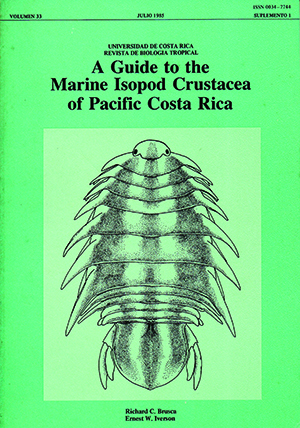Current Issue
The marine isopad crustaceans known from, or expected to occur on Pacific Costa Rican shores are presented. Keys, diagnoses, synonymies and figures are given for 37 species, in 14 families. Five previously undescribed species are included, three of which are formally named and described: Metacirolana costaricensis n. sp., Rocinela murilloi n. sp., and Cyalhura guarocnsis n. sp. A general overview of oceanographic aspects of Pacific Costa Rican waters is given, as well as a brief review of biological studies that have been published concerning Costa Rican shores. An introduction to the anatomy and general biology of isopods is presented, which includes a somewhat detailed discussion of head appendages.
Announcements
We accept media files
We accept media files in a variety of formats.
More…
“Advances and challenges of coral restoration in Latin America and the Caribbean”
Editores científicos:
Alma Paola Rodríguez-Troncoso, Adolfo Tortolero-Langarica y Juan José Alvarado
1. Centro Universitario de la Costa, Universidad de Guadalajara, México.
2. Instituto Tecnológico de Bahía de Banderas, México.
3. Universidad de Costa Rica, Costa Rica.

More…
Revista de Biología Tropical / International Journal of Tropical Biology and Conservation, is a full open access journal from the University of Costa Rica focused on tropical biology and conservation. All issues, from 1953 to the present, are available for free download here.
Our scope
Our journal publishes scientific articles that increase our understanding of biology, conservation, and biomedical life sciences in the tropics.
Selection criteria are the quantity and quality of new information and its potential interest to the general audience as well as to specialists. The studied ecosystems, or at least the organisms, must be tropical.
Regular issues
We give preference to feature original articles that include testable study questions —for example, studies with an experimental design to evaluate factors that influence biological variables, or studies that explain the mechanisms underlying biological or biomedical phenomena such as, for example, behavior or physiology. Field studies should be extensive enough to identify temporal or spatial patterns. We also welcome systematic or phylogenetic studies above the species level, meta-analyses, and bibliometric studies that critically examine what is known and what remains to be done in any field of tropical biology.
Review articles are mostly published by invitation of the Editorial Board to recognized authorities. Other specialists interested in submitting a review must first send a titled outline to biologia.tropical@ucr.ac.cr. Accepted proposals receive the same evaluation as regular manuscripts.
All reviews and meta-analyses need to identify and fill gaps in knowledge, present methodological advances, and propose future research directions.
Note about old data: We encourage authors to compare old results with more recent data or to use the data within a meta-analysis. Studies based on data collected over six years ago must include a justification of why they are still of interest, and in the case of field studies, they need to present spatial patterns or temporal trends of historical significance. The Editorial Board evaluates the validity of methods and the relevance of results before sending the manuscript to reviewers.
The journal now has one issue per year (continuous publication from January 1st to December 31st) and publishes articles the same week that an edited version becomes available. Until 2021, it published four regular issues per year: issue 1 (January – March), issue 2 (April – June), issue 3 (July – September), and issue 4 (October – December).
We do not publish notes; short communications; species lists; single new species; range extensions; new records and other preliminary or short studies; or highly specialized technical reports based on protocols (e.g. agricultural, forestry, biochemical, microbiological, aquaculture, fishery or similar studies that only apply well known techniques to particular cases of local interest).
Special issues
Special issues financed by research organizations are accepted after approval by the Editorial Board. They may contain a diversity of report types, including short papers, new records, new species descriptions, checklists, technical reports, etc. To publish a special issue, contact biologia.tropical@ucr.ac.cr for a cost estimate.
Target audience
Researchers with an interest in studying all fields of tropical biology.
Why publish in Revista de Biología Tropical?
- Fully indexed: Revista de Biología Tropical is included in Science Citation Index Expanded, REDIB Journals Ranking, Current Contents, Google Scholar, Biological Abstracts, and about 50 other international indices.
- Rapid decision and publication (7 days for first decision, 4-8 months from submission to publication).
- Fair: We use a double-blind system for a fair evaluation of manuscripts.
- High impact, not only because of its citation rate but also because it is widely read in countries with the highest tropical biodiversity, ensuring your article will have the most impact on the conservation of tropical biodiversity. Web of Science Impact Factor of 0.6. SJR Impact Factor of 0.28 (Q2).
- A personalized treatment by our dedicated staff.
- World Class Editorial and Scientific Boards.
- Open Access: All articles, since the first issue in 1953 to the present are freely available online (Archives) so they are more likely to be cited than articles behind pay-walls.
- FREE PUBLICATION: Each article receives 10 free pages of space in PDF format, which is enough for most scientific papers. Additional pages can be published in page layout format of the pdf at a cost of $50 each. Supplementary material such as additional texts, figures, tables, graphics, and databases at a cost of $60. Contact biologia.tropical@ucr.ac.cr for more information.
OAI-PMH: https://revistas.ucr.ac.cr/index.php/RBT/oai
If you can not access an article please enter to "Archives"
SUBMIT a new manuscript here



